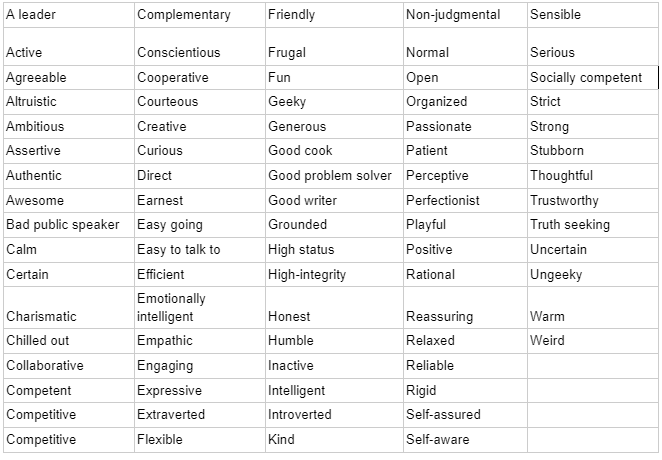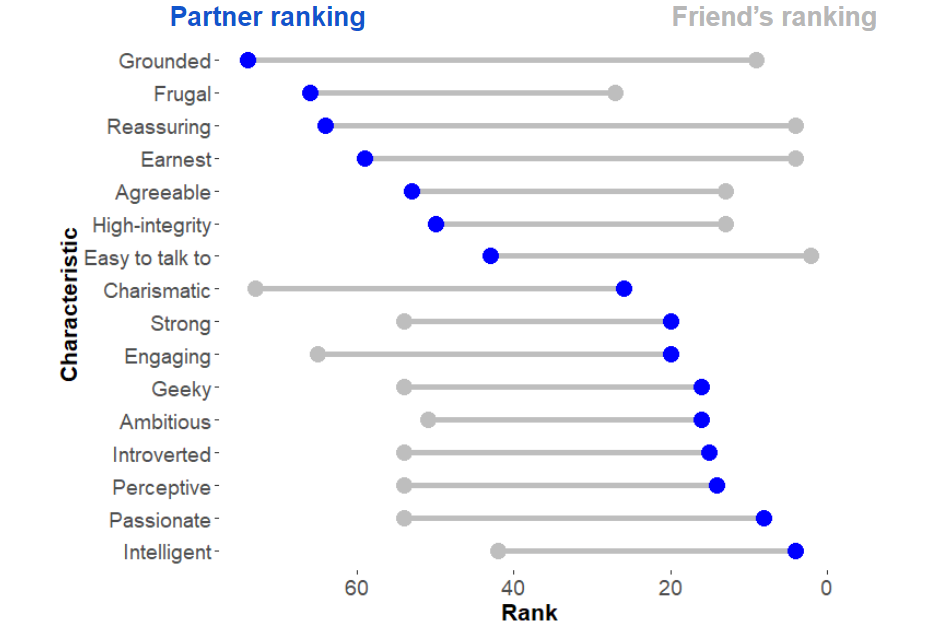My attempts at seeing myself more clearly - how I got lots of feedback and what I learnt
I asked a bunch of my friends to give me feedback on my strengths and weaknesses - I was surprised by the results...
Summary
I want to be more aware of my strengths and weaknesses. I want to better understand what I have to offer to others, professionally and socially.
So I used an app to create a way for my partner and a bunch of my friends to rank me against 80 personality characteristics (e.g. trustworthy, charismatic, intelligent etc.). I also rated myself.
There was some disagreement, and I learnt a lot!

There are different ways of thinking about “self awareness” and I don’t think “what others think of me” is the best option
Being self-aware usually refers to either “knowing how you are perceived by others” or “knowing yourself” - e.g. what you want, how you feel, what you value etc.
This second type of self-awareness has been particularly important in helping me make better decisions and is the basis of my regular review process. For example by asking questions like:
What brings me joy?
What are my values?
How can I feel fulfilled in my relationships and career?
This type of self awareness seems really powerful as it has helped change the highest level objectives in my life. This kind of reflection has, for example, completely changed my career.
Other people can help with this stuff too, but mostly by telling me what they’ve discovered about themselves, not by telling me what I value.
But I do care about what others think of me
It’s usually sensible advice to “care less what other people think” (and I’m trying).
That said, there are many areas where an outside view is helpful. Particularly when it comes to work-relevant skills and strengths, where you are often directly compared to other similar people. I want to pick roles that play to my strengths and I want to build on my strengths until they are mega-strengths. I also want to generally be self aware about how I am in personal relationships. I want to be able to talk accurately about what I do and don’t offer to others. And if I can be a better friend and partner, I want to know how.
I have tried to get feedback on my strength and weaknesses a lot
Here are the things I’ve tried (and my feedback on that feedback mechanism)
Standard professional 360 feedback (4/10 - okay, but a form doesn’t undo the issues that make giving feedback to colleagues difficult)
An absolute tonne of personality and strengths tests (5/10 - fun, but they mostly seem to tell me what I told them)
Here’s a spreadsheet of some of my results of the past few years:
Building a database of compliments I receive (7/10 - good, but very positively skewed)
Building a database of my success and failures (7/10 - good, but very skewed towards my own judgement)
Building relationships that are high trust where I am confident others can share their opinion of me, then playing authentic relating games such as “what I think you think of me” (10/10 - this one is very good, but takes time)
Screaming “why don’t you like me?” at people on the street (1/10 - okay I didn’t actually do this, but I did ask a random guy for a compliment once)
One thing I haven’t tried, but have seen a bunch of others try, is an anonymous feedback form that is open to anyone. The context of who is giving me the feedback seems very important to me, so I never found this option particularly appealing.
The rest of this post is about a new thing I came up with recently: asking a bunch of friends to rank me on several dozen personality characteristics!
I used an app to allow my friends to decide which of a wide array of personality characteristics describe me best
Here’s what I did:
Created a long list of personality characteristics (then filtered them a little bit to pick ones that seemed more important to me)
Put them into this app, which allows people to make pairwise comparisons. This means picking one of two randomly selected characteristics that they think best describes me (the app then uses an algorithm to produce a full ranking)
I did the a bunch of ratings myself (so I could compare to my friends’ rankings)
I sent the app to the 18 friends (people who I’ve spent a lot of time with in recent years and/or have worked on projects with me recently)
I gave the app to my partner, who did a bunch of ratings of me too.
I compared my ratings to my friends’ and my partner’s ratings.
Here is the list of characteristics that I asked people to rank me on:
Note: The main problem with my results below is the lack of any reasonable control. It’s possible that the rankings are just how most people would rank their friends/self/partner. I couldn’t think of a good way to build a reasonable control though so just accepted that as a weakness of these results. I think the disagreements below are particularly interesting regardless.
My Results: My friends, my partner and I disagree about my strongest and weakest character traits
There are a lot of ways to look at this data. But first, here are the top and bottom 10 characteristics according to each of the three people/group:
The traits where there was the most agreement that I was strong were:
Organized
Kind
Good problem solver
Trustworthy
Honest
Awesome
Truth seeking
(These were scored in the top 25% by all 3 groups)
The traits where there was the most agreement that I was weak were:
Assertive
Stubborn
Competitive
Inactive
Extraverted
Self-assured
Rigid
Ungeeky
(These were scored in the bottom 25% by all 3 groups)
My Results: The average of the ratings from all three groups
I averaged the percentile rank from the three sets of ratings (I appreciate that this is a slightly weird way to average this data). It produced the following average percentile rating:
My Results: There were a bunch of disagreements
By looking at which characteristics had the biggest difference in ranking between the people giving feedback, I was able to see where I may have blind-spots (i.e. where my rankings were a lot higher or lower than my friend’s or partner). These graphs show characteristics where the difference in ranking was more than 30 places, and at least one of the two people/group rated it high or low (either in the top or bottom 13%)
Characteristics where I disagreed with my partner
She thinks I’m much more passionate, charismatic, and socially competent than I do. But she doesn’t rate my cooking so highly (that one hurt)
Characteristics where I disagreed with my friends
My friends think I’m frugal and positive, and relaxed when actually I spend my days anxiously browsing Amazon. They think I am a lot more reassuring and socially competent than I do, which was very surprising. And they think I’m less courteous and more judgemental than I do which frankly is stupid and ridiculous.1
Characteristics where my partner disagreed with my friends
I like this comparison because it can be interpreted as the difference between knowing me well and knowing my very very well. My friends think I have integrity, and that I’m grounded and agreeable, but my partner has apparently seen me up close for too long to agree. But she did rate my intelligence and passion highly which I liked.
My Results: I also gathered qualitative data
Alongside the above rankings I asked my friends to tell me a story of a time I had done something well and a time I did something badly. I then categorised these stories. Here is a breakdown of categories where I got more than one piece of feedback in that category:
Positive feedback on my parties and blogs makes me happy. The fact that the most negative feedback was all about decision-making was particularly valuable to hear. I sometimes disagreed that the specific decision mentioned was bad, but I definitely make some bad decisions. I think I have often been too hesitant to ask for help with big life decisions, so this is unsurprising.
My Results: Conclusions and actions
I found this exercise really helpful and illuminating, and a bunch of the results were surprising. I found a lot of the feedback really encouraging and validating. Though I also found some feedback a little upsetting (in these cases I talked to the person about it).
Overall it was a really useful exercise that gave me a bunch of insight. The main things I want to do following this analysis are:
Write up any future important decisions I am making (e.g. career, relationship etc.) and get feedback on them (as described by Alex here)
Lean into my strengths more. How can I make use of being super organised, trustworthy and honest? I’m not totally sure yet - please let me know if you have ideas!
Keep running events. People like them, I enjoy doing it and it seems to play to the organised/personable strengths.
Try harder when cooking for my partner… seriously… I don’t want to have to make any more relationship decisions, I’m bad at those apparently.
Acknowledgement: Thanks to the friends and my partner who gave me all this feedback. I really appreciate it and I am very grateful to have your trust and support.
Hahahaha, look at my funny joke (though I actually just realised that my list didn't include “funny” on the list of characteristics. Oversight….)












This is a great approach and great visualization. I think you could probably promote and sell this as a tool people would love to use for themselves!
One thing to improve a tiny bit: I'm a little confused as the descriptors are a mix of good, bad, and unclear. E.g., is "Strict" a good thing? Is "Ungeeky" good or bad?
I did a lot of 360 appraisals of a formative nature. I found asking the soft questions gave me the most insight, whether it was from a colleague in the same job or a cleaner, receptionist, service user....
I liked the 3 qustions approach. What do you want me to start doing, what do you want me to stop doing, want do you want me to continue to do. From the answers one could extrapolate a lot about how other rated different characteristics. It even lead me to change my behaviour in a few instances!